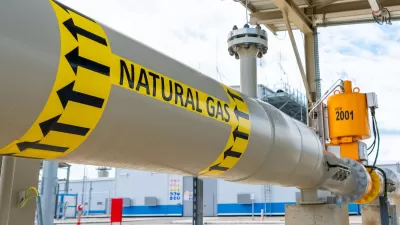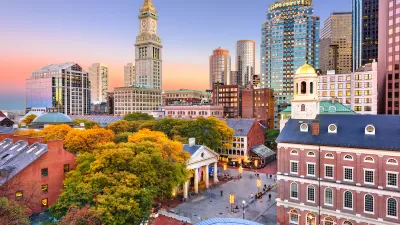Banning gas-powered appliances is one part of a broader toolkit of changes in building codes that could vastly improve efficiency.

The debate over gas stoves blew up—no pun intended—in the last week, but Daniel C. Vock argues that the focus on appliances overshadows other ways that building codes can promote efficiency. “Just revising the rules governing energy use in new construction can lead to sizable reductions in air pollution, advocates say, not to mention lower bills and a more comfortable environment for the people who live and work in the buildings.”
According to Vock, “The federal Energy Department estimates that if every state adopted the most recent model building codes for commercial and residential properties, it could reduce carbon dioxide pollution by 900 million metric tons by 2040.” The newest codes require added insulation, more efficient equipment, better lighting, and other changes that lower greenhouse gas emissions and often don’t add to construction costs.
Funding from the Inflation Reduction Act (IRA) can help states move toward updating their codes, Vock writes. “For example, the law provides $330 million in grants to state and local governments to adopt the latest residential and commercial codes. It sets aside more than twice that amount of money—$670 million—to develop ‘stretch codes’ that local governments can impose to develop ‘zero-energy’ buildings that produce enough renewable energy to offset their core energy use.”
FULL STORY: Cutting Building Emissions is About More Than Gas Stoves

Planetizen Federal Action Tracker
A weekly monitor of how Trump’s orders and actions are impacting planners and planning in America.

Map: Where Senate Republicans Want to Sell Your Public Lands
For public land advocates, the Senate Republicans’ proposal to sell millions of acres of public land in the West is “the biggest fight of their careers.”

Restaurant Patios Were a Pandemic Win — Why Were They so Hard to Keep?
Social distancing requirements and changes in travel patterns prompted cities to pilot new uses for street and sidewalk space. Then it got complicated.

Albuquerque Route 66 Motels Become Affordable Housing
A $4 million city fund is incentivizing developers to breathe new life into derelict midcentury motels.

DC Area County Eliminates Bus Fares
Montgomery County joins a growing trend of making transit free.

Platform Pilsner: Vancouver Transit Agency Releases... a Beer?
TransLink will receive a portion of every sale of the four-pack.
Urban Design for Planners 1: Software Tools
This six-course series explores essential urban design concepts using open source software and equips planners with the tools they need to participate fully in the urban design process.
Planning for Universal Design
Learn the tools for implementing Universal Design in planning regulations.
Heyer Gruel & Associates PA
JM Goldson LLC
Custer County Colorado
City of Camden Redevelopment Agency
City of Astoria
Transportation Research & Education Center (TREC) at Portland State University
Camden Redevelopment Agency
City of Claremont
Municipality of Princeton (NJ)





























